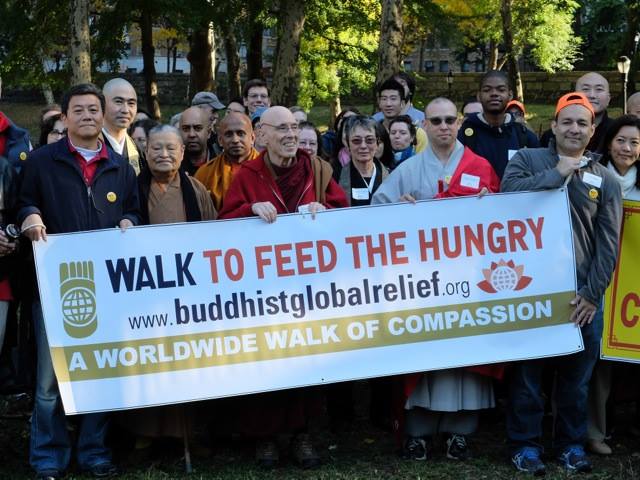
Saturday’s Walk to Feed the Hungry warbled an optimistic note amid a spate of otherwise demoralizing food-deprivation headlines. First, on Friday, a $5 billion cut to food stamps took effect as Congress failed to extend a stimulus-era expansion of the program. The cuts came, of course, as a record number of Americans enroll in food stamps; the new budget will provide an estimated $36 less per household each month. Then, on the very morning of the walk, the front page of The New York Times featured a story about the Intergovernmental Panel on Climate Change, which leaked a draft report predicting a 2 percent reduction in global food production in each of the next several decades. Meanwhile, according to the same report, global food demand is “expected to rise as much as 14 percent each decade” due to population growth. Even a lifetime humanities bumpkin like me can see that these numbers don’t bode well.
Holding these ominous developments in mind, I ambled up to the walk’s starting point on a grassy lawn in Riverside Park. There was certainly a temptation toward cynicism; toward the sense that a few hundred Buddhists on the Upper West Side might feel, well, quaint. Thankfully, I was disabused of these suspicions. Maybe it was the smiling yet emboldened presence of Venerable Bhikkhu Bodhi, Buddhist Global Relief’s founder. Donning a red hoodie to match his robes, the abbot addressed a crowd ranging from monastics to casual practitioners, from stately grandparents to distracted tikes. He spoke of the effort’s origin, which occurred to him—quite literally—in a dream. After manifesting that initial vision in 2010, the walks have grown with each passing year. He closed his remarks with excitement at the news of solidarity walks in India and Cambodia, reiterating that the problem and its solution stretch far beyond New York City.
Then again, maybe what reassured me was a conversation I had while walking alongside fellow participant Alison Zhou. For the past two years, Zhou has organized an affiliated hunger awareness walk at the Wat Lao Lane Xang Temple in Willington, Connecticut. While noting that she preferred the intimacy and quiet of her comparatively small event, she conceded that New York City’s walk would likely raise more funds. Zhou works in the Connecticut education system where she witnesses educational disparities connected to class and race. These issues have direct and indirect ties to food insecurity, as many low-income students of color arrive hungry and rely on school lunches for sustenance. She views Buddhism as a vital practice for liberating herself from internal emotional blocks, thereby allowing her to bear witness and act upon societal injustice. For her, the walk is part of a larger personal and global process of refiguring the lines between my problem and your problem.
The words of Ven. Bhikkhu Bodhi and Alison Zhou were clarion calls to action, and their sincerity was truly inspiring. But maybe what really warmed me to this philanthropic stroll was the more casual conversation. All around were the chirpings of new friends making acquaintance and old ones catching up. I was supposed to watch the Red Sox game today, but I guess the World Series ended… I’m here to support my Mom who meditates with a Zen group in New Jersey… That’s a beautiful dog. I could feel the stringing together of little unconscious knots as we formed a one-day sangha. This miniature community, perhaps even beyond the fundraising, was the brilliance of Buddhist Global Relief’s Walk to Feed the Hungry; new relationships were kindled and old ones renewed within the context of radically engaged Buddhism.
Many say the world will need a populist social movement to avert the impending hunger crisis. And maybe they’re right. But before we turn our gaze toward that daunting prospect, perhaps it’s best we instill urgency within our own micro-communities. Ven. Bhikkhu Bodhi and Buddhist Global Relief are doing just that for the Buddhist practitioners of New York City and beyond.
—Max Zahn, Editorial Intern
Further Reading
Into the Fire: Food in the Age of Climate Change